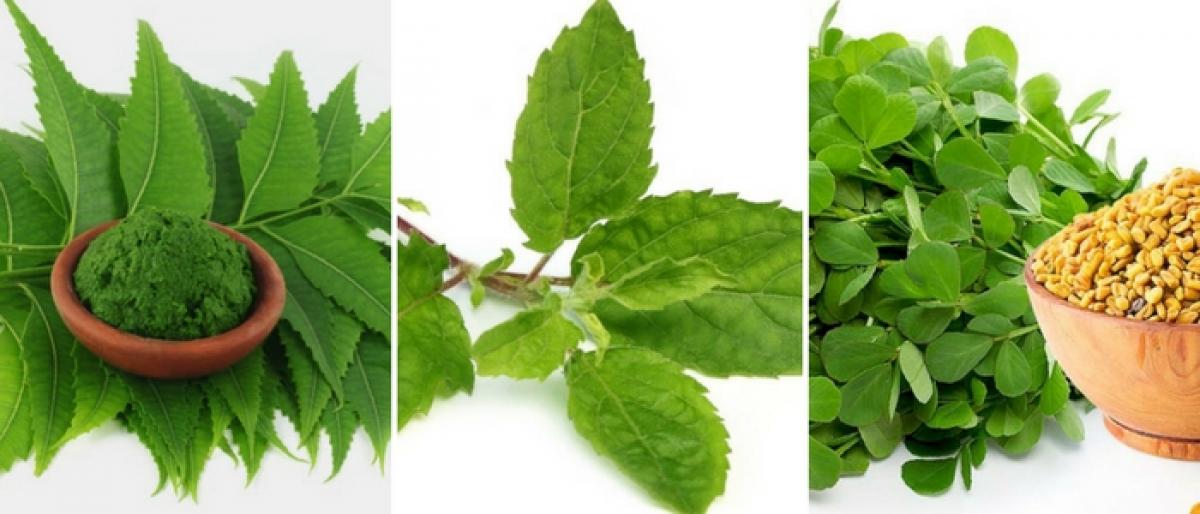Herbs to enhance beauty

Over centuries of usage, it has been seen that herbs have many beneficial properties for both health and beauty. Another important advantage is that they have shown a lack of harmful side-effects.
Over centuries of usage, it has been seen that herbs have many beneficial properties for both health and beauty. Another important advantage is that they have shown a lack of harmful side-effects.
Synthetic preparations and chemical ingredients, on the other hand, can lead to a build-up of toxins in the system, allergies and irritation. Herbs also have powerful healing properties.
In fact, they have definite protective, preventive and corrective actions. They also contain vitamins, minerals, enzymes and other valuable substances, which are important for the health of the skin and hair.
Basil or Tulsi
Basil or tulsi is commonly used for many ailments in most homes. It is said to help colds, coughs and indigestion. Modern research has revealed that it helps to purify the air, apart from its soothing and curative actions on the skin and scalp. Boil tulsi leaves in water. Let it cool. Make a paste of the leaves and apply on pimple and acne prone skin. It helps to reduce inflammation and cure eruptions.
Neem
One of the most common medicinal herb is Neem, which contains organic sulphur compounds that were considered extremely beneficial for skin ailments. In fact, the entire Neem tree can be used for treating medical problems, because the leaves, twigs and branches, the fruit and seeds are all used in Ayurvedic healing. It can easily be used as a home remedy for skin and hair care, not only to prevent problems, but also to soothe and cure.
Take a handful of neem leaves and simmer in five cups of water over a very low fire. Leave overnight. Next morning, strain and wash face with the water. Apply paste of neem leaves on pimples/rash. It can also be applied on acne, boils, heat rashes and prickly heat. In cases of dandruff and itching of the scalp, neem leaf infusions are helpful. Use the infusion as a last rinse, after washing the hair.
Fenugreek
Fenugreek (methi) is another common medicinal ingredient that has been used since the ancient times in fevers, digestive problems, respiratory ailments, etc. It is also known to help in controlling high blood sugar and cholesterol. Fenugreek is also known for its powerful healing qualities and benefits for the hair. The seeds not only help to control dandruff, but are helpful in lice infestations.
Fenugreek also contains lecithin, which actually helps to moisturise the hair and is thus useful in cases of dry, damaged and chemically treated hair. So, it not only helps to promote healthy hair growth, but also adds body and shine. Fenugreek seeds can be soaked in water overnight. Next morning, make a paste of the seeds and apply on the scalp.
Leave on for 20 to 30 minutes and then rinse off very well with water. You can also add olive oil to the paste. This helps in dandruff. Use the water to rinse the hair.
Amla
Amla is a popular ingredient in herbal remedies. It is said to check greying. So, have the juice of one raw amla daily, after adding it to a glass of water.
Amla juice can be diluted with water and applied on the scalp with a light massage. Part the hair in sections and apply on scalp. Rinse off after 15 minutes. It helps to restore health to the hair and also controls dandruff. In fact, it is said to stop hair fall and greying.
Turmeric
Turmeric (haldi) is a part of our traditional medicinal and beauty aids since the ancient times, due to its anti-inflammatory and antiseptic properties. It also helps to reduce pain and swellings.
It has been used in beauty care since the ancient times too, when it was added to body packs, or “ubtan.” In fact, it has become a part of wedding rituals. Turmeric helps to soften and brighten the skin. Used over a period of time, it also helps to remove tan and lighten skin colour.
To remove tan: Add a pinch of turmeric to curd and apply daily on the face. Wash it off after 20 minutes.
Body Pack: Mix besan (gram flour) with curd and a pinch of turmeric into a paste. Apply on the arms and legs three times a week. Wash it off after half an hour.
For facial hair: Apply a paste of turmeric powder and milk and rub this on the skin with a circular motion. It is said to discourage facial hair over a period of time, but it may leave a slight yellowish colour on the skin.







